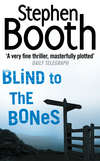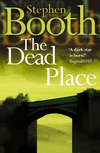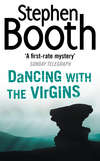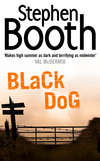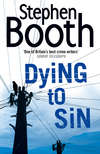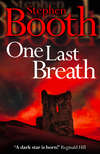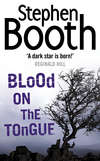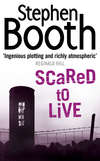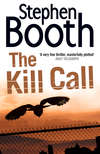Читать книгу: «Blind to the Bones»
Blind to the Bones
STEPHEN BOOTH

Copyright
HarperCollinsPublishers 1 London Bridge Street London SE1 9GF
First published in Great Britain in 2003 by HarperCollins
This edition published in 2010.
Copyright © Stephen Booth 2003
Stephen Booth asserts the moral right to be identified as the author of this work
This novel is entirely a work of fiction. The names, characters and incidents portrayed in it are the work of the author’s imagination. Any resemblance to actual persons, living or dead, events or localities is entirely coincidental.
A catalogue record for this book is available from the British Library
All rights reserved under International and Pan-American Copyright Conventions. By payment of the required fees, you have been granted the nonexclusive, nontransferable right to access and read the text of this e-book on-screen. No part of this text may be reproduced, transmitted, downloaded, decompiled, reverse engineered, or stored in or introduced into any information storage and retrieval system, in any form or by any means, whether electronic or mechanical, now known or hereinafter invented, without the express written permission of HarperCollins e-books.
Source ISBN: 9780007130672
Ebook Edition © April 2012 ISBN: 9780007369218
Version: 2015-04-29
Dedication
For Tom Jefferson
I’m grateful to John and Von Morley, and members of Black Pig, for their help during the writing of this book. Although the Border Rats are fictional, the Border tradition exists in many parts of Britain.
Contents
Title Page
Copyright
Dedication
1
2
3
4
5
6
7
8
9
10
11
12
13
14
15
16
17
18
19
20
21
22
23
24
25
26
27
28
29
30
31
32
33
34
35
36
37
38
39
40
41
42
43
Keep Reading
About the Author
Also by the Author
About the Publisher
1
Friday
As soon as he opened the door, he could hear the screaming. It ripped through the damp air and shrieked in the yews. It echoed from the gravestones and died against the walls. It was like the sound of an animal, dying in pain. Yet this sound was human.
With every breath he took, Derek Alton seemed to draw the noise into his own lungs with the air, until something like an answering scream came from deep inside him. The asthmatic wheeze of his inflamed air passages was so high pitched that his ears couldn’t locate its direction, but identified it as a noise that came from the air around him. The pain in his upper chest told him where that noise came from.
And Alton knew where the screaming came from, too.
With shaking fingers, he brushed some of the dust from his sleeve. The exertion had made his collar stick to the back of his neck, and a few strands of hair had fallen over his forehead, where they lay like barbed wire on his skin. He rubbed at a fresh scratch on his knuckles, but managed only to smear a streak of blood across the back of his hand. He could taste dust in his mouth, too – old dust, the debris of years, stirred into the air by a random act of violence.
The screaming reminded Alton of the shriek of agony he had once heard from a rat, when a terrier had flushed it from its nest in a barn and its back had been broken under a farmer’s spade. The dying rat had squealed with its last strength, as its legs kicked and its pale claws clutched and uncoiled in the dry earth.
Now he waited, expecting to hear other noises. At first, there was only the stirring of the breeze in the yews and the drip of rainwater from the ivy on the church walls. But gradually he began to distinguish something else – a rhythmic thudding. It reverberated inside a room some distance away, well beyond the first houses on the road into Withens. It was like a ritual drumbeat, folding over on itself and creating multiple layers of sound. He shivered as he recognized the undertones of menace, which spoke of imminent death.
Then there was a burst of laughter somewhere in the village, followed by the slam of a door. A female voice shouted something that Alton couldn’t make out. It was just one sentence, half a dozen words, and then the voice had gone. Further away, a ewe called to its lambs on the slopes of Withens Moor, where the hefted flocks still roamed their territories on the heather and peat bog. Alton had seen Withens Moor. He had seen Black Hill and Hey Moss, too. And he knew the moors themselves were dying.
Death had been on Derek Alton’s mind all day. He had awoken with a jolt in the early hours of the morning, panicking that he might have disturbed Caroline with one of his bad dreams. But as soon as he opened his eyes and stared at the faint light on the bedroom curtains, he realized that his mind had been banging back and forth like a pendulum, swinging between the distant dualities of darkness and light, winter and spring, death and renewal. He might have been thinking of the end of winter and the first invasion of spring. But, mostly, he was sure he had been thinking of death.
Alton heard footsteps approaching through the aisle of the church. There were no carpets in St Asaph’s, and his visitor was wearing heavy work boots that thumped on the stone flags.
He turned back towards the nave and squinted at the figure moving slowly out of the light to stand beside him. Once they were standing close together, the porch of the church seemed far too small.
Neil Granger was wearing a black leather jacket of the kind that Alton thought of as motorcyclist’s gear, though he knew Neil didn’t have a motorbike, only the old Volkswagen Beetle he used for getting to and from his job at the Lancashire Chemicals factory in Glossop. He looked very tired.
‘You might as well go, Neil,’ said Alton. ‘You can’t do any more here tonight.’
Neil had sweat running from his temples into the black smudges on his cheeks. He wiped a hand down the side of his face, spreading the smudges even more. But he looked at Alton with concern when he heard his wheezing.
‘Are you sure you’re all right?’
‘I’m fine,’ said Alton. ‘I just needed some fresh air. And we ought not to do any more until the police have been to take a look.’
‘Don’t hold your breath, then. They might get here next Easter.’
‘I know, I know. But all the same …’
‘You want to do things by the rules.’
Alton sighed. ‘I wish there were still rules for this kind of thing.’
‘You like rules, don’t you? It goes with the job, I suppose.’
‘Well, there are the Ten Commandments.’ But Alton smiled to show that he knew it was a joke.
‘In Withens?’ said Neil.
‘Yes, even in Withens.’
‘I think you’ll find they’ve broken all the tablets of stone.’
A few feet away, a blackbird scuttled into the undergrowth over the horizontal gravestones that lay like fallen monoliths in front of the church. The blackbirds were always the last to go to their roosts in the dusk. They hopped jerkily across the graves in the half-light and rustled hopefully among the dead leaves, searching for insects and larvae. It was enough to make some people nervous of entering the church at this time of night. Even the blackbird had its duality. It was a creature of darkness, as much as of light.
Neil flapped the lapels of his jacket to fan his face. Alton could smell his sweat, and he felt a surge of affection and gratitude towards the young man for taking the trouble to stop by and help. Not many people would have done that. Not in Withens.
‘I appreciate what you’ve done, Neil,’ he said.
But instead of acknowledging Alton’s thanks, Neil turned his face away, staring out into the churchyard.
‘Vicar,’ he said, ‘I’m sorry.’
‘What for?’ said Alton, surprised.
Neil waved a hand vaguely towards the village. ‘Well, all this. It’s not what you expected, is it? Not what you deserve really, I suppose.’
‘I don’t know what you mean, Neil.’
Neil laughed, then coughed as the dust got into his throat. Alton caught the glitter of the rings in his ear and the sheen of his black hair. He wanted to put his hand round the young man’s shoulder and tell him it was all right. Whatever Neil was apologizing for, it was perfectly all right. But he hesitated, worrying that the gesture might be misinterpreted, then cursing himself for being so cautious. He ought to be able to give forgiveness, if that was what Neil Granger needed. But by the time the reactions had run through his brain, the moment had passed, and it was too late.
In any case, Neil immediately seemed to have forgotten what he had been saying, and his mood changed again.
‘Well, like I said, we’ll tackle the churchyard this weekend.’
‘Yes,’ said Alton. ‘We’ll do that.’
‘I was hoping Philip would help us, but he’s being mardy about it.’
‘Your brother is busy these days. I understand.’
‘Some new business he’s got involved in. I don’t know what he’s up to any more. But we’ll get it sorted between the two of us, eh? Remember, Vicar – death and renewal, winter and spring –’
‘The darkness and the light.’
‘That’s it. Time for a bit of light on the subject, I reckon.’
Neil turned to look at the vicar then, but Alton could barely see his eyes. They, too, were dark, and they were at the wrong angle to catch the light leaking into the porch from the nave. Alton couldn’t tell what expression was on Neil’s face. But a strange thought ran through his mind. If he had been able to read Neil’s eyes at that moment, he might not have seen any expression at all – only a reflection of the gravestones outside in the churchyard.
‘I’ve got to be up early in the morning, anyway,’ said Neil.
Alton nodded. ‘Do you remember, the year before last –?’
But Neil held up a hand before Alton could finish his question.
‘I don’t even want to think about it,’ he said. ‘Two years ago, Emma should have been there.’
‘Of course. I’m sorry.’
‘It’s all right. I suppose it seems a long time ago now, for most people. I don’t expect everybody to remember.’
‘But I do remember,’ said Alton. ‘And there are her parents, of course.’
‘Oh, her parents remember,’ said Neil.
Because of the failing light, Alton could see little beyond the wall of the churchyard now, except the streetlights in Withens. He was sure it wasn’t Caroline’s voice he had heard in the village earlier. Perhaps it had been Fran Oxley, or even Lorraine, or one of the other members of the Oxley family.
But it definitely wasn’t Caroline – she would never laugh like that, or shout so loudly in public. At this moment, Caroline would be walking past the Old Rectory, averting her eyes from the house and garden until she could turn into the crescent and reach their bungalow.
Somewhere in the darkness beyond the streetlights was Waterloo Terrace, where the Oxleys lived. Alton could picture the eight brick cottages, tightly packed like a row of soldiers, standing shoulder to shoulder against the larger stone buildings that clustered around them.
Derek Alton and Neil Granger stood in the church porch a few moments longer, listening to the noises from the village. The screaming faded, then grew louder again.
‘Does that sound like a rat to you?’ said Neil.
‘Yes, it does.’
Neil nodded. ‘OK, then.’
He rubbed at his face as he began to walk away down the flagged path. His clothes rustled like the sound of the blackbird in the dead leaves. Alton lifted his head for a second to look towards the village. And when he turned back, he found that Neil had already disappeared into the darkness beyond the yew trees.
Later, Derek Alton would have a lot to regret. He would be sorry that he hadn’t watched Neil Granger leave, and hadn’t observed the moment when the young man passed out of his sight. Perhaps he could have called Neil back and said something that might have changed his mind. But he hadn’t. Alton had been too distracted by the noise coming from the village, and too absorbed in his own concerns. He would feel guilty for that, too.
But most of all, Derek Alton would regret not saying goodbye.
There were ten more dead bodies to collect that night. Others had probably died underground, or had been trapped deep in the spaces between the stone arches and the hillside behind them. But Sandy Norton wasn’t satisfied.
‘We’re going to have to put more poison down,’ he said. ‘The buggers are breeding like, well –’
‘Rats?’
‘Yeah.’
Norton shone his torch into the mouth of the middle portal. It was one of the nineteenth-century tunnels, the old westbound line, which wasn’t used for anything these days. The railway track had long since been ripped up, and the tunnel abandoned. The arched walls glistened with water, and a small stream ran into a stone conduit near his feet. Just beyond the limit of his torch beam, there were shadowy, scurrying movements on the dirt floor.
‘It makes you wonder what they find to eat,’ said his mate, Jeff Cade, as he took off his rubber gloves and put them away in a pocket of his overalls. ‘I mean, aren’t they supposed to live near people? You’re never more than six feet away from a rat, and all that? But there are no houses around here any more.’
Norton laughed. ‘That’s no problem. Look up there, where the old station and platforms used to be. You see that car park and the picnic area, right? Well, that’s like a drive-in McDonald’s as far as these little buggers are concerned. Just think – there’s all the food that people leave on the grass when they’ve been having their picnics, and all the bits of sandwiches and chocolate bars, and God knows what, that they chuck out of their car windows. There’s thousands of people coming past here, especially at the weekend, ever since they turned the old railway line into a footpath.’
‘It’s called the Longdendale Trail. I know.’
‘And then there’s the road up there – the A628. Have you ever seen how much stuff lorry drivers bung out of their cabs? You can’t walk along the roadside up there without getting splattered with lumps of flying pork pie and pasties. It’s disgusting. Particularly when they have tomato sauce. I hate tomato sauce. But it means there’s waste food lying all along the roadside. Not to mention the cafés in the lay-bys. The bins are overflowing with rubbish up there sometimes.’
‘I suppose you’re right.’
‘No, there might not be people living here any more. But the whole world comes by to feed the rats in Longdendale.’
‘It’s a good job they can’t get to the cables in the other tunnel. They can gnaw their way through anything, given time, can rats.’
‘We need some more poison, anyway,’ said Norton.
A few yards away, in the old eastbound tunnel, a pair of four hundred thousand volt cables ran through a concrete trough. The cables entered the tunnel three miles away at Dunford Bridge, carrying a section of the National Grid between Yorkshire and Manchester. As they emerged again at Woodhead, they ran past a relay room, then up into a series of giant pylons that marched down the valley towards Manchester. The abandoned Woodhead tunnels had saved the moors from being covered in pylons for those three miles.
Sandy Norton had often admired the quality of the stonework in the tunnel arches, which had survived in good condition for more than a hundred and fifty years. But their present use was one the navvies who built the tunnels couldn’t have imagined as they hacked their way through the hill with their pickaxes and gunpowder.
In fact, those navvies wouldn’t even have been able to imagine the newer two-track tunnel to the south, which had been cut in the 1950s and accommodated the country’s first electrified rail line. That tunnel was empty, too, now. Apart from the little battery-powered locomotive that ran on the maintenance track in the National Grid cableway, the last trains had run through the Woodhead tunnels over twenty years ago.
Norton and Cade were packing up to leave the site when a car slowed and stopped on the road overhead. They heard it pull on to the bare concrete pad where a house had once stood above the tunnel entrances, but which was now no more than a pull-in for a good view down the valley. After a few moments, the car started up again and drove off.
‘That was an old Volkswagen Beetle,’ said Norton.
‘How do you know that?’
‘I recognize the sound of the engine. It’s distinctive – air-cooled, you know. I used to have a Beetle myself years ago, when I was a lad.’
‘Have we finished with these rats, then?’
‘For now,’ said Norton. He turned off his torch. ‘You know, I wouldn’t like to walk through this tunnel in the dark.’
Cade shuddered. ‘Me neither. Three miles in the dark? No thanks. It’d be bad enough, even without the rats.’
He turned back towards their van. But Norton didn’t follow him immediately. He was looking up at the stones over the arch of the tunnel mouth. He’d once been told that the navvies who built the old tunnels had been very superstitious men. They were convinced that their tunnelling had disturbed something deep in the hill, which had been the cause of all the disasters that happened to them – the tragedies that had earned Woodhead the nickname ‘Railwaymen’s Graveyard’. Norton had heard that when the navvies had finished tunnelling, their final act had been to carve faces at each of the tunnel entrances to control the evil spirits. But if the carvings were still there, they were so worn now that he couldn’t make them out.
Sandy Norton shrugged. He didn’t know about evil spirits. But the faces hadn’t done much to control the rats.
Finally, he locked the steel gate that prevented unauthorized access to the middle tunnel. All three tunnels had their own gates. Without them, rail enthusiasts and others who were even less welcome would always be trying to get into the tunnels. Some of those folk would want to walk all three miles to the other end, just to prove they could do it. They wouldn’t be bothered by the rats. They wouldn’t take any notice of the risk from the high-voltage power cables. They wouldn’t even be deterred by the National Grid’s yellow-and-black signs on the gates. The meaning of the signs was clear enough, with their symbol of a black lightning bolt cutting through a body. It was clear even without their message, which read: ‘Danger of Death’.
Whenever the phone rang in the Old Rectory, Sarah Renshaw stopped what she was doing and looked at the nearest clock. It would be important to have the exact time, when the moment came.
She was in the sitting room, where the mahogany wall clock said five minutes past ten. Sarah checked her watch, and adjusted the minute hand slightly so that it read the same. She didn’t want there to be any confusion. All the times were important – the time Emma had last been seen, the time her train had left Wolverhampton, the time she should have arrived home. And the exact minute they got news that she had been found would be vital. Sarah felt comforted by the recording of the minutes. It was more than a ritual. Time was important.
Howard had gone to answer the phone, so Sarah waited. In the middle of their big oak Jacobean sideboard, a candle was burning. The wick was already halfway down, and the melted wax was pooling in the brass holder. There were plenty more candles in one of the drawers, and Sarah wanted to light a new one right away to mark the moment, as if the act itself would make a difference. But she hugged her hands under her armpits and restrained herself as she listened to Howard speaking in the next room. She would be able to tell by the tone of his voice.
Sarah looked at the clock again. Six minutes past ten. For a moment, she panicked. Which would be most important – the exact time the phone had rung, or the moment she had got the news? Which would she celebrate, in the years to come?
‘Howard?’ she called. ‘Howard?’
But he didn’t respond, and Sarah quickly calmed again. Howard’s voice was subdued. If the call had been about Emma, she would have known it by now. The news would have communicated itself to her through the wall. Sarah had often thought that the call, when it came, wouldn’t produce any normal-sounding ring on their phone, but would announce itself like a fanfare. She vaguely imagined a line of liveried trumpeters like those who appeared with the Queen at state occasions. Her ears already rang to the sound they made.
And certainly there would be the sensations – the tingling and the little quivers of pleasure that she experienced whenever she felt that Emma was close by. When the call came, she expected a jolt like a great charge of electricity, like the entire four hundred thousand volts from the cables that ran through the hillside two hundred feet below their house.
Yes, when the phone call came, she would know. Sarah would have no need to listen to the sound of Howard’s voice, or to hear what the person at the other end of the line was saying. The fanfare would sound, and the electricity would surge through her body, stinging her hands and burning the skin of her face. And the mahogany wall clock would stop of its own accord at the exact moment, at the precise second and micro second, and it would never start again. Sarah would know.
Howard came into the sitting room, instantly dominating it with his bulk. He was wearing a thick, white Arran sweater that made her want to wrap her arms round him and bury her face in the wool. But he shook his head briefly, and averted his eyes.
Sarah had been standing at the bookcase near the door. She ran her hand along some of the spines, and touched a folded and dog-eared piece of paper that had been used to mark a page in Twentieth-Century Design. She tried to breathe in the scent of the books, but the familiar smells of paper and ink seemed fainter tonight. Subjects and Symbols in Art had a small stain on the cover that had almost faded now because Sarah had touched it too often. She took out Art Deco Graphics and a David Hockney book, and put them back the other way round.
Many of the books were inscribed in Emma’s own handwriting on the title page. She had only put her name and the date, but the inscriptions seemed to offer a sort of continuity, a narrative reflecting a particular period in Emma’s life.
These were the books Emma had once handled and read, which meant that the words on their pages must have entered her mind and become part of her. Sarah was able to pick up a book that Emma had once opened, and read the words that Emma had studied.
Sarah Renshaw often found herself spending time rearranging the books. Perhaps by shuffling the dates on the books, she could change the order of events in Emma’s life. If she had read this book before that one, might things have been different? Would Emma have been at home now, complaining that her mum was messing up the order of her books?
Sarah wiped a tear from her eye. She caught herself just before she spoke aloud, and dropped her voice to a whisper, so that Howard wouldn’t hear her.
‘I’ll help you put them back exactly how you want them, dear. We’ll do it together.’
Sarah turned away from the bookcase and took down a calendar from the top of the TV set. She crossed off another day, neatly deleting it with two short, sharp strokes of a black marker pen.
It was Day 743. Emma Renshaw had been missing for over two years.
Now the laughter in the village had subsided, or the woman making the noise had moved out of earshot. Derek Alton stood in his church porch and listened to the sound of Neil Granger’s car engine as it moved slowly out of Withens. It climbed the road away from the village and began to cross the miles of bare moorland towards the valley of Longdendale.
Finally, even the sound of the engine disappeared behind the hill. The blackbirds settled into the yew trees, Alton’s breathing returned to normal. And as it grew dark, Withens became almost entirely silent. Except for the screaming.
Начислим
+34
Покупайте книги и получайте бонусы в Литрес, Читай-городе и Буквоеде.
Участвовать в бонусной программе
